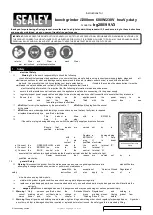
RG25DH Operation • Service • Maintenance • Parts Manual
20
Safety
Air pressure in the rear tires of some tow vehicles may be
increased to accommodate the additional weight of the trailer.
Inflate rear tires approximately 6 psi above normal, but do
not exceed the pressure limit stamped on tire.
Connecting Your Trailer
Lower the coupler onto the hitch-ball and follow the
instructions below to properly fasten the coupler to the hitch-
ball. Do not allow your self to become distracted. Ensure
that the coupler is properly fastened to the hitch-ball before
moving to the next step.
COUPLER- Push down on the latch and fully open the
coupling. Lower the coupler onto the hitch-ball.
Check that the ball clamp is positioned below the coupler. The
coupler should completely cover and enclose the hitch-ball.
Tighten the coupler latch down.
Move the tow vehicle forward slightly, or push rearward on
the trailer to ensure that the hitch-ball is properly seated
inside the coupler. Recheck that it is tight.
Check all connections at each stop. Make sure the hitch and
hitch-ball are securely attached to your tow vehicle and the
trailer coupler is properly connected to the hitch-ball. Use the
checklist at the end of these instructions. If you suspect or
detect something is wrong, contact the nearest Rayco Dealer.
Safety Chains
The purpose of the safety chains is to keep the trailer
connected to your tow vehicle in the unlikely event the coupler
comes off the ball or the ball comes off the hitch. Safety chains
are attached to the trailer tongue and are equipped with hooks.
DO NOT tow the trailer without the safety chains securely
attached to the towing vehicle. DO NOT attempt to pull the
trailer by the safety chains alone, unless this is necessary to
get the combination off the roadway to a safe place.
The left chain crosses underneath the trailer tongue and hooks
to the right side of the tow vehicle permanent hitch, frame
or structure, or to the tow vehicle bumper brackets. Do not
attach chains to the ball or to a ball mount that is removable.
The right chain hooks to the left side in the same manner.
Crossing the chains under the tongue allows the minimum
amount of slack for turning. Control slack by hooking the
chain back to itself or by twisting the links to shorten chain.
Be sure the hooks are secured.
Make sure these chains attach securely to your tow vehicle
and do not drag on the roadway.
Emergency Brake Cable/Chain
Trailers with brakes have a third chain, called the emergency
brake chain. This chain applies the brakes automatically in
the unlikely event of a separation of the trailer from the tow
vehicle. Attach this chain as close to the vehicle center
as possible; to the tow vehicle permanent hitch, frame or
structure, or to the bumper brackets. Twist chain to take
up most of the slack and secure. Some slack is necessary
to prevent the emergency brake from activating on turns or
inclined driveways.
Lighting Conditions
Make sure all tow vehicle and trailer lights function properly.
The connecting wires need slack to allow your tow vehicle
to make turns. Do not allow wires to drag on the roadway.
Loading
Load the heaviest end (engine end) of the vehicle in-tow to
the FRONT of the trailer. Failure to load facing forward may
result in sway or WHIPPING and lead to total loss of control.
DO NOT load cargo in your vehicle-in-tow or on your trailer.
Loading cargo in your vehicle-in-tow or on trailer may result
in sway or WHIPPING.
Before loading your vehicle-in-tow, make sure the trailer is
securely attached to your tow vehicle hitch. Make sure the
safety chains are properly connected. During the loading
process, keep bystanders at least 25 feet away.
Make sure that the entire width of the tires will be on the
ramps before driving on the ramps.
Approach ramps slowly, check angle of machine to insure
proper alignment with trailer, then proceed to drive up
ramps into trailer.
1. Drive the machine forward and align it with the trailer.
2. Unlock and lower the trailer ramps.
3. Drive the machine forward so that the front wheels enter
the trailer channels, and continue driving the machine up
the ramps until the rear drive wheels are on the trailer.
4. Remove the machine tie-down pin from the storage
sleeve on the trailer and insert it through the matching
holes in the machine and the trailer.
5. Raise the trailer ramps and lock them in the travel position
with the lock bars and associated retaining pins.
The chains need slack to allow your vehicle to make turns.
Summary of Contents for RG25HD
Page 48: ...RG25DH Operation Service Maintenance Parts Manual 48 Troubleshooting ...
Page 49: ...RG25DH Operation Service Maintenance Parts Manual 800 392 2686 49 Troubleshooting ...
Page 50: ...RG25DH Operation Service Maintenance Parts Manual 50 Troubleshooting ...
Page 51: ...RG25DH Operation Service Maintenance Parts Manual 800 392 2686 51 Troubleshooting ...
Page 52: ...RG25DH Operation Service Maintenance Parts Manual 52 Troubleshooting ...
Page 53: ...RG25DH Operation Service Maintenance Parts Manual 800 392 2686 53 Troubleshooting ...
Page 54: ...RG25DH Operation Service Maintenance Parts Manual 54 Troubleshooting ...
Page 55: ...RG25DH Operation Service Maintenance Parts Manual 800 392 2686 55 Troubleshooting ...
Page 56: ...RG25DH Operation Service Maintenance Parts Manual 56 Troubleshooting ...
Page 57: ...RG25DH Operation Service Maintenance Parts Manual 800 392 2686 57 Troubleshooting ...
Page 66: ...RG25DH Operation Service Maintenance Parts Manual 66 Hydraulic Drive Assembly ...
















































